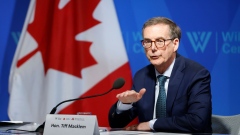Jun 13, 2018
U.S., Canada, Mexico Unite Long Enough to Win 2026 World Cup Bid
, Bloomberg News
(Bloomberg) -- The World Cup is coming back to America.
Nations at the 68th FIFA Congress in Moscow backed North America’s joint bid to host the 2026 World Cup. With a handful of games in Mexico and Canada but the majority in the U.S., the 2026 bid promises the richest and most lucrative tournament in the history of global soccer.
The expanded 2026 men’s event, featuring 48 teams for the first time, will be played in 16 different cities -- 10 in the U.S., plus three sites in both Canada and Mexico. The U.S. will host 60 of the 80 matches, including the final, scheduled for MetLife Stadium outside New York City.
Wednesday’s vote, held in Moscow on the eve of this year’s tournament, was about much more than just the 2026 host nation. Many in the international community viewed this decision as a reflection of how far FIFA has come after years of scandal and widespread corruption, some of which was tied to the 2018 and 2022 World Cup bidding processes. When Gianni Infantino replaced embattled Joseph “Sepp” Blatter as president of soccer’s governing body in 2016, he acknowledged that the organization was “in a crisis” and promised reforms.
The 2026 award is also a victory for many of FIFA’s corporate partners, which will have the advantage of more teams and the world’s biggest media market. That includes Adidas AG, Dalian Wanda Group, and Coca-Cola Co., as well as NBCUniversal’s Telemundo and 21st Century Fox Inc., which have already secured the U.S. Spanish- and English-languange broadcasts.
On paper, it was hard to make the case for Morocco. Canada, Mexico and the U.S. are home to a combined 491 million people and two of the world’s biggest media markets. All of the proposed stadiums exist already. And perhaps most persuasive, the North American bid promised FIFA a record $11 billion in profit, nearly double the $6.6 billion that governing body expects to earn in the 2022 event in Qatar and more than double the $5 billion estimated by Morocco.
But these votes are often about much more than stadiums, infrastructure and even profit. Every one of FIFA’s 200-plus members holds a single vote, and regions tend to vote in blocks. That means the 31-member Caribbean federation has three times the voting power of South America, which includes soccer powers Brazil and Argentina. Large votes are often swayed by small concessions promised to the right number of smaller nations or by regional biases. Morocco’s bid, for example, received vocal support from France and a large contingent of Middle Eastern and North African nations.
Eight years ago, the U.S. was in a similar position, when it bid for the 2022 tournament. Competing against South Korea, Japan, Australia and Qatar, the U.S. seemed like the obvious choice given its existing stadiums and geo-political standing. Former president Bill Clinton and other celebrities spent nearly two years campaigning and the U.S. still lost to Qatar. The event has since been moved to November to avoid Qatar’s blistering summer temperatures, bribery acusations abound, and potential human rights violations at the stadium sites have caused outrage from the international community.
The money promised by the North American bid will be a strong boost to FIFA. The Switzerland-based organization reports its revenue in four-year cycles, and most recently claimed $5.7 billion for the cycle culminating in the 2014 World Cup in Brazil. The tumultuous last four years, plus the controversy over Russia, has made the 2015-18 cycle a “tougher sell,” according to Nielsen, and the next four years leading up to the Qatar event might be equally rough. Citing a number of high-profile sponsors dropping FIFA, London newspaper The Independent reported that FIFA’s 2018 World Cup sponsorship revenues were down $240 million.
The U.S. last hosted the World Cup in 1994, an event that eventually gave rise to Major League Soccer, now in its 23rd season. The 3.6 million attendees remain a World Cup record, despite the fact that only 24 nations competed at the time. Mexico hosted the World Cup in 1986; Canada never has.
Typically, the host nation gets an automatic berth in the World Cup. It’s not clear how that would work with three countries as co-hosts. Mexico has played in every World Cup since 1990. Canada qualified once, in 1986. The U.S. team failed to qualify this year.
--With assistance from Ira Boudway and Jake Rudnitsky.
To contact the reporter on this story: Eben Novy-Williams in New York at enovywilliam@bloomberg.net
To contact the editors responsible for this story: Janet Paskin at jpaskin@bloomberg.net, Christopher Elser
©2018 Bloomberg L.P.























